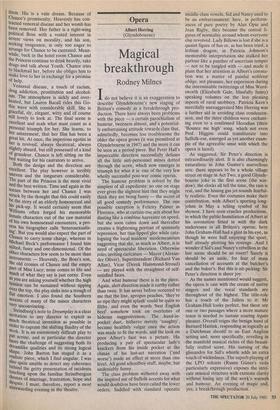Op e ra
Albert Herring (Glyndebourne)
Magical breakthrough
Rodney Wiles
do not believe it is an exaggeration to describe Glyndebourne's new staging of Britten's comedy as a breakthrough pro- duction. There have always been problems with the piece — a certain parochialism of humour, tweeness almost, and a potential- ly embarrassing attitude towards class that, admittedly, becomes less troublesome the older the opera grows (it was premiered at Glyndebourne in 1947) and the more it can be seen as a period piece. But Peter Hall's impeccable direction successfully defuses all the little anti-personnel mines dotted through the score, which now emerges in triumph for what it is: one of the very few wholly successful post-war comic operas. The humour problem is solved by the simplest of all expedients: no one on stage ever gives the slightest hint that they might think they are being funny — the secret of all good comedy performance. The one possible exception is Felicity Palmer as Florence, who at curtain-rise sets about her dusting like a combine-harvester on speed, but she soon calms down and thereafter creates a frightening portrait of spinsterly repression, her thin-lipped glee while cata- loguing the local maidens' misdemeanours suggesting that she, as much as Albert, is in need of spectacular liberation. Otherwise roles inviting caricature — Mayor (Alexan- der Oliver), Superintendent (Richard Van Allan), Vicar (Derek Hammond-Stroud) — are played with the straightest of self- satisfied faces.
And what humour there is in the piece. Again, alert direction made it earthy rather than twee. It has never before occurred to me that the line, apropos peaches, 'they're so ripe they might splash' could be quite so filthy, and even the words 'best English beef somehow took on overtones of hideous suggestiveness. The hand-in- pocket duet, hitherto merely 'naughty', became healthily vulgar once the action was made to fit the words, and the look on poor Albert's face was a picture. His producing a pair of spectacular lady's knickers from his inside pocket at the climax of his last-act narration (`and worse') made an effect at more than one level. All good schoolboy stuff, maybe, but undeniably funny.
The class problem withered away with the inspired use of Suffolk accents for what would doubtless have been called the lower orders. Saddled with standard operatic
I
middle-class vowels, Sid and Nancy used to be an embarrassment: here, in perform- ances of pure poetry by Alan Opie and Jean Rigby, they became the central fi- gures of normality around whom everyone else revolved. Lady Billows is lost if she is a quaint figure of fun or, as has been tried, a lesbian dragon; in Patricia Johnson's memorable interpretation she stalked her parlour like a panther of uncertain temper — not to be tangled with — and made it plain that her attention at Albert's corona- tion was a matter of painful noblesse oblige, not pleasure, her expression during the interminable twitterings of Miss Word- sworth (Elizabeth Gale, blissfully funny) speaking volumes on the less pleasing aspects of rural snobbery. Patricia Kern's mercifully unexaggerated Mrs Herring was a further aid in avoiding class condescen- sion, and the three children were enchant- ing even to a confirmed Herodian (their `Bounce me high' song, which not even Prof. Higgins could transliterate into Suffolk-ese, emerged as yet another exam- ple of the agreeable smut with which the opera is laced).
As suggested, Sir Peter's direction is extraordinarily alert. It is also charmingly naturalistic in John Gunter's marvellous sets: there appears to be a whole village street on stage in Act Two, a good Glynde- bourne joke in the first scene (the win- dow), the clocks all tell the time, the rain is real, and the hissing gas jet sounds fearful- ly realistic. Even the costumes make their contribution, with Albert's sporting long- johns in May a telling symbol of his shyness. I have seen crueller productions, in which the public humiliation of Albert at his coronation fitted in with the dark undertones in all Britten's operas; here John Graham-Hall had a glint in his eye, as though he were half enjoying the sport, half already plotting his revenge. And I wonder if Sid's and Nancy's rebellion in the last scene should be so overt? Surely it should be an aside, for fear of mass cancellation of accounts at the butcher's and the baker's. But this is nit-picking: Sir Peter's direction is sheer joy.
As the names mentioned would suggest, the opera is cast with the cream of native singers and the vocal standards are throughout of the highest. The title-role has a touch of the Juliets to it: Mr Graham-Hall looks perfect, but there are one or two passages where a more mature tenor is needed to sustain soaring legato phrases. Overall reigns the benign hand of Bernard Haitink, responding as logically as a Dutchman should to an East Anglian setting and, more specifically, revelling in the manifold musical riches of this beauti- fully crafted score. His nursing of the glissandos for Sid's whistle adds an extra touch of wickedness. The superb playing of the LPO soloists (Rusen Giines's viola particularly expressive) exposes the intri- cate musical structure with extreme clarity without losing any of the work's warmth and humour. An evening of magic and, yes, a breakthrough production.


















































 Previous page
Previous page